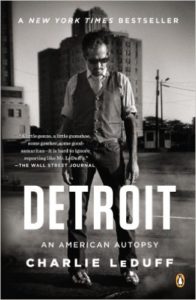 Charlie LeDuff returns to his hometown as a journalist for the Detroit News. Once the richest city in America, Detroit has plunged to one of the poorest. In its heyday, it was the vanguard of the automobile industry. Today it leads the country in crime, unemployment, illiteracy, and foreclosures.
Charlie LeDuff returns to his hometown as a journalist for the Detroit News. Once the richest city in America, Detroit has plunged to one of the poorest. In its heyday, it was the vanguard of the automobile industry. Today it leads the country in crime, unemployment, illiteracy, and foreclosures.
LeDuff paints a vivid picture of empty factories which are routinely burned for their copper. Whole blocks of what was decent neighborhoods are now decaying or gutted- out houses. Crime is rampant; systems put into place to protect the public are corrupt.
As a newspaperman, LeDuff attempts to uncover what destroyed Detroit. He talks to city officials, to homeless squatters, to mothers whose children have been murdered or died of overdose. He befriends firefighters, pointing out their worn-out equipment, the holes in their personal protective gear. He talks to police, some of them good, some on the take.
LeDuff’s writing is tough—no tip-toeing around issues for him. He dives into the heart of a problem and sifts through the ashes to root out the truth. His writing style is caustic and revealing, funny, and honest. He gives specific examples of corruption and ineptitude, and backs up the charges with facts. This is the work of an investigative reporter at the top of his game.
Detroit: An American Autopsy was an eye-opener for me. I knew the city was a has-been, but I had no idea of its depth of despair. I’ve never been so thankful to live in the Northwest; never so grateful not to live in Detroit. This is a memorable work, a suspenseful chronicle of decay.
To learn more about this Pulitzer Prize-winning journalist and Detroit: An American Autopsy, visit http://charlieleduff.com/

